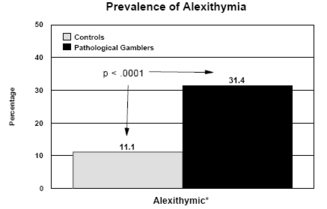The WAGER, Vol. 1(21) – Increased likelihood of alexithymia among pathological gamblers
Alexithymia is a disturbance in affective and cognitive function. This problem is relatively common among people with addictive disorders. Individuals with alexithymia experience their emotions in an undifferentiated and mostly physical form. These people also have an impaired capacity to benefit from dynamic psychotherapy because they have difficulty identifying and describing how they feel. A study of 1,147 university students explored the hypothesis that alexithymia may be a risk factor for pathological gambling. The level of pathological gambling was classified using the South Oaks Gambling Screen (SOGS). The study found that pathological gamblers were significantly more likely than the control group (SOGS score = 0) to be alexithymic; in addition, pathological gamblers had greater difficulty identifying feelings and were more engaged in external thinking. It is currently unclear whether alexithymia is a cause or a consequence of pathological gambling. As a cause, alexithymia may predispose gamblers to gamble excessively in an attempt to modulate uncomfortable affects. As a consequence, alexithymia might be a response of pathological gamblers who seek solutions to financial and social difficulties in gambling instead of in their own affective and cognitive processes.

*Subjects classified as alexithymic based on Toronto Alexithymia Scale (TAS) total >= 74
Sources:
American Psychiatric Association. (1984). Psychiatric Glossary. Washington, D.C.: Author.
Lumley, M.A., & Roby, K.J. (1995). Alexithymia and pathological gambling. Psychotherapy & Psychosomatics, 63, 201-206.
This public education project is funded, in part, by The Andrews Foundation and the Massachusetts Department of Public Health.
This fax may be copied without permission. Please cite The WAGER as the source.
For more information contact the Massachusetts Council on Compulsive Gambling, 190 High Street, Suite 6, Boston, MA 02110.